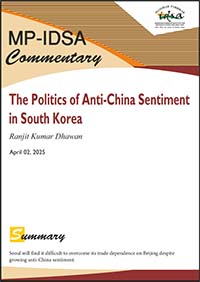The Politics of Anti-China Sentiment in South Korea
- April 02, 2025 |
- IDSA Comments
Introduction
The unexpected and sudden declaration of martial law by President Yoon Suk Yeol on 3 December 2024, and his subsequent impeachment by the National Assembly not only highlighted the intense political rivalry in South Korea, but also triggered anti-China sentiment in the country.[i] Notably, South Korean politics is deeply fragmented between the two major ideological groups—‘conservatives’ or rightists, and ‘progressives’ or leftists. The suspicion about Chinese interference in the South Korean political system is stated to be more prominent among the conservatives in South Korea. According to some conservative leaders, the Chinese government has been fuelling the ideological divide in South Korea by supporting the progressives.[ii]
Although President Yoon Suk Yeol belongs to the conservative ideology, the anti-China sentiment had flared even under the progressive administrations. For example, during the progressive administration of President Roh Moo-hyun (2003–2008), China’s historical claims over the ancient Goguryeo kingdom caused massive anti-China protests in South Korea.[iii] On the other hand, the conservative Park Geun-hye administration (2013–2017) had a pro-China foreign policy and it showed more contempt towards Japan.[iv] In recent years, South Korea–China maritime disputes, and China’s claims on Korean national symbols and cultural assets have strained the relationship between Seoul and Beijing. However, the present rise in anti-China feeling among the South Koreans appears to be more complex.
Sino-South Korean Relations
China’s relationship with the pre-divided Korean Peninsula has been historically characterised as ‘lips and teeth’. Korea had tributary relationship with the ‘Middle Kingdom’, and the impact of Chinese cultural influence can still be observed on the Korean Peninsula. In the past, Chinese rulers fought against the foreign powers to guard their interests in Korea. Notably, the Chinese clashed with Japan during 1894–1895 to protect China’s suzerainty over the Korean Peninsula. Also, thousands of Chinese People’s Volunteers (CPV) laid down their lives during the Korean War (1950–1953) in support of North Korea and resisted American forces from reaching the Chinese border. As a result, the relationship between China and South Korea remained hostile during the Cold War period.
However, with the end of the Cold War and establishment of diplomatic relations between Seoul and Beijing in 1992, the relations between the two countries developed by leaps and bounds. China’s vast market, natural resources and cheap labour were efficiently utilised by the South Korean companies, and China became the largest trading partner of South Korea. On the other hand, Chinese tourists, workers, students, and even brides flocked to South Korea in large numbers, making the Chinese the largest foreign community in South Korea. Geographical proximity, cultural similarities, historical linkages and convergence of economic interests played a significant role in deepening South Korea–China relations. Remarkably, South Koreans even felt less threatened by China’s military rise and were more worried about Japan’s possible rearmament.[v]
Confrontation and Cooperation in South Korea–China Relations
There are various issues which have caused irritation in South Korea–China relationship and have led to anti-China sentiment among South Koreans. First, the success of some Chinese companies has taken the world by surprise. This rapid change has effectively turned China from an imitator to an innovator of cutting-edge technology. In recent years, various Chinese companies have been catching up with the South Korean companies and have been rapidly gaining market share across the world.[vi] From electronics to ship-building, artificial intelligence tools to electric vehicles, Chinese brands have been threatening South Korean business groups. The growing economic threats from China have been igniting anti-China sentiment in South Korea. Evidently, in the recent months, Seoul has become more critical towards some Chinese companies.[vii]
Second, China’s regular attacks on Korean history, national identity and cultural symbols have strained the relationship between Seoul and Beijing from time to time. These include China’s claims over ancient Korean kingdoms of Goguryeo and Balhae, traditional dish Kimchi, traditional song Arirang, and traditional dress Hanbok. Although about two million people belonging to the Korean ethnic community live in China, Beijing’s efforts to appropriate these Korean historical and cultural artifacts have generated strong anti-China sentiment in South Korea.[viii]
Third, the maritime disputes between Seoul and Beijing have also contributed to building anti-China sentiment in South Korea. The activities of Chinese fishermen in the territorial waters claimed by South Korea are strongly resented in Seoul and had even led to violent clashes.[ix] More recently, the setting up of huge steel structures by China in South Korea–China Provisional Measures Zone (PMZ) of the Yellow Sea caused uproar in South Korea.[x] Also, China’s support to the Kim dynasty regime in North Korea, and Beijing’s approach towards the North Korean refugees had been a cause of deep concern to the South Korean government.
The beginning of second Donald Trump administration in the United States in January 2025 and its transactional approach in economic affairs has thrown new challenges to both South Korea and China. In this regard, Beijing has been seeking closer partnership with Seoul.[xi] In March 2025, the foreign ministers of South Korea and China met in Tokyo, and pledged to deepen their relationship.[xii] A few days later, the industry ministers of South Korea and China met in Seoul to foster closer trade partnership.[xiii] Therefore, despite growing anti-China sentiment in South Korea, it will be difficult for Seoul to overcome its trade dependence on Beijing.
Conclusion
China’s rapid rise as an economic and manufacturing powerhouse was largely viewed by the South Koreans as an opportunity to benefit from vast Chinese labour, natural resources and market. However, China’s rising economic prowess and political assertiveness is threatening South Korea’s export-oriented economy and has been fuelling anti-Beijing sentiment in the country. More recently, the ongoing political turmoil in South Korea has only contributed to deepening distrust towards China among the South Korean people. However, the economic policies of President Trump has created apprehensions in South Korea as Seoul is developing closer engagement with Beijing. Paradoxically, while the Trump administration’s main concern has been ‘China’s rise’, it has helped to deepen South Korea–China relations.
Views expressed are of the author and do not necessarily reflect the views of the Manohar Parrikar IDSA or of the Government of India.
[i] Kim Arin, “Anti-CCP Themes Ring through Rallies against Yoon’s Impeachment”, The Korea Herald, 12 February 2025.
[ii] Lee Chan-Kyu, Lee Ah-Mi and Seo Ji-Eun, “Anti-China Rhetoric, Conspiracy Theories Rife At Pro-Yoon Rallies”, Korea JoongAng Daily, 19 January 2025.
[iii] Peter Hays Gries, “The Koguryo Controversy, National Identity, and Sino Korean Relations Today”, East Asia, Vol. 22, No. 4, Winter 2005, pp. 3–17.
[iv] Leif-Eric Easley and Kyuri Park, “South Korea’s Mismatched Diplomacy in Asia: Middle Power Identity, Interests, and Foreign Policy”, International Politics, Vol. 55, No. 2, 2018, pp. 242–263.
[v] David C. Kang, China Rising: Peace, Power, and Order in East Asia, Columbia University Press, New York, 2007, p. 104.
[vi] Han Woo-Duk, “Not the ‘Mistake of the Continent’ Anymore (KOR)”, Korea JoongAng Daily, 4 October 2024.
[vii] Byun Hye-jin, “Korea Launches Antidumping Probe into Chinese Steel”, The Korea Herald, 8 October 2024.
[viii] Park Han-sol, “China’s ‘Cultural Appropriation’ Continues with Hanbok Featured at Beijing Winter Olympics”, The Korea Times, 6 February 2022.
[ix] Park Si-soo, “Chinese Sailors Detained for Killing Korean Coast Guard”, The Korea Times, 28 September 2008.
[x] Seo Ji-Eun and Yonhap, “Chinese Embassy Defends Steel Structures’ Installation in Yellow Sea”, Korea JoongAng Daily, 26 March 2025.
[xi] Kwak Yeon-soo, “China Seeks Closer Ties With South Korea, But Challenges Remain”, The Korea Times, 11 January 2025.
[xii] “Japan, S Korea, China Meet to Strengthen Ties at ‘Turning Point in History’”, Al Jazeera, 22 March 2025.
[xiii] Yonhap, “Trade Chiefs of Korea, China, Japan Discuss Advancing Trade Cooperation at Three-Way Meeting”, The Korea Times, 30 March 2025.






